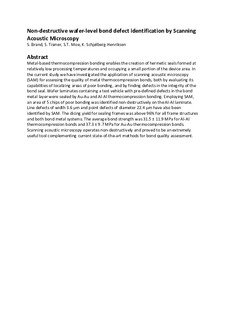Non-destructive wafer-level bond defect identification by scanning acoustic microscopy
Journal article, Peer reviewed
Accepted version
Permanent lenke
http://hdl.handle.net/11250/2483768Utgivelsesdato
2015Metadata
Vis full innførselSamlinger
- Publikasjoner fra CRIStin - SINTEF AS [5801]
- SINTEF Digital [2501]
Originalversjon
Microsystem Technologies : Micro- and Nanosystems Information Storage and Processing Systems. 2015, 21 (7), 1385-1394. 10.1007/s00542-014-2328-zSammendrag
Metal-based thermocompression bonding enables the creation of hermetic seals formed at relatively low processing temperatures and occupying a small portion of the device area. In the current study we have investigated the application of scanning acoustic microscopy (SAM) for assessing the quality of metal thermocompression bonds, both by evaluating its capabilities of localizing areas of poor bonding, and by finding defects in the integrity of the bond seal. Wafer laminates containing a test vehicle of sealing frames with pre-defined defects in the bond metal layer were sealed by Au–Au and Al–Al thermocompression bonding. Employing SAM, an area of five chips of poor bonding was identified non-destructively on the Al–Al laminate. Line defects of width 3.6 µm and point defects of diameter 22.4 µm have also been identified by SAM. The dicing yield for sealing frames was above 96 % for all frames of widths 100–400 µm and for both bond metal systems. The average bond strength was 31.5 ± 11.9 MPa for Al–Al thermocompression bonds and 37.3 ± 9.7 MPa for Au–Au thermocompression bonds. Scanning acoustic microscopy operates non-destructively and proved to be an extremely useful tool complementing current state-of-the-art methods for bond quality assessment.
